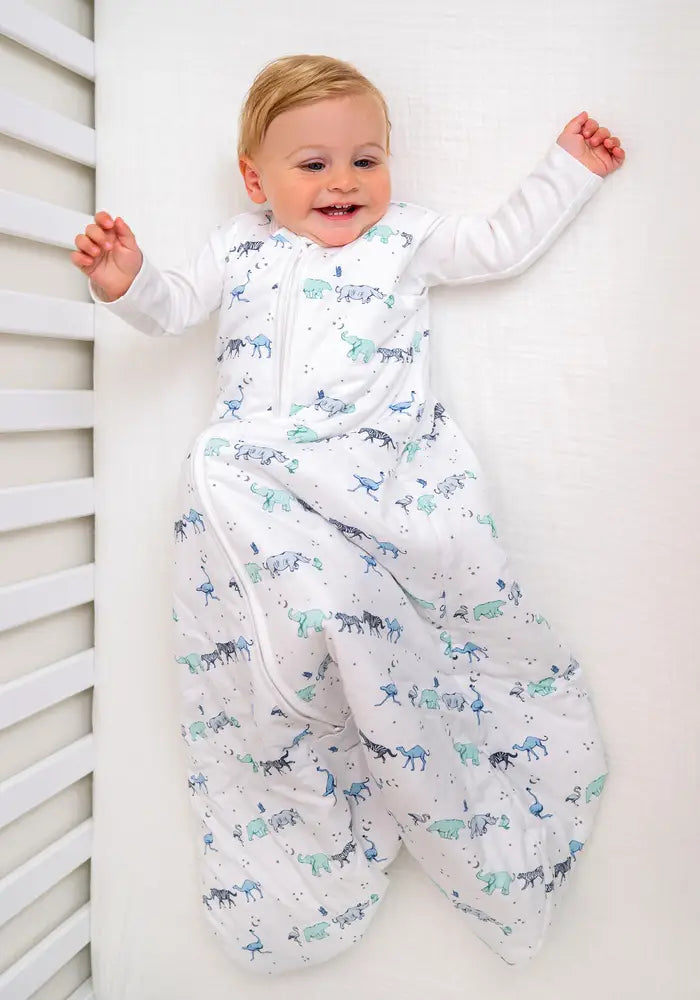WINTER BEDTIME ROUTINE TIPS
ORIGINALLY POSTED: 21 August 2023
A consistent bedtime routine is key for creating good sleep habits for your baby. (Plus, babies who follow a consistent routine are more likely to sleep better…and longer too!)
It’s important to stick to a routine throughout the year, but during the winter you may consider some specific steps to ensure everyone stays nice + cosy.

Best Winter Bedtime Routine Tips
- Room Temp - Your baby’s room should be comfortably warm but not excessively hot. 16 - 22°C is ideal and make sure to watch out for drafts.
- Bathtime - Start the routine with a soothing bath. This is a great cue for baby to start winding down for sleep. Make sure to use baby-formulated bath products and keep the water warm, but not too hot. Dry off with a hooded towel to make things easy and oh-so-cute!
- Moisturize + Massage - Apply a baby-formulated lotion after bath to help prevent dry winter skin. You could use the lotion or baby oil to give your baby a gentle massage, which can super soothing and help further relax them.
- Dress for sleep - Layering is always a great idea for winter. Opt for footie pajamas and a warmer TOG sleeping bag, like our 2.5 TOG baby sleeping bag collection. Not sure how to dress them? Peep our blog for more guidance.
- Dim the lights - Reduce noise in the home and shut curtains to create an environment that’s most conducive to sleep.
- Storytime or lullabies - This can be a great moment for bonding. Share your favorite bedtime stories (or score new reads from the library.) Sing soft, soothing melodies and no worries if you’re not quite Adele, your baby will love hearing you
- Feeding - Consider incorporating a final feed as part of the bedtime routine so their belly is full for nighttime. Be sure to have burp cloths on hand to avoid evening spit-up clean-up.
- Cuddles + Kisses - Take a few moments to cuddle your babe before putting them into the bedside cot or crib. It can create an extra sense of security as your babe starts drifting off to sleepyland. Try to put them down while they’re drowsy but still awake.
- Try white noise - Some babies find white noise comforting, which means it can help them fall asleep and stay sleep. You can use a white noise machine; some bedside cots even have them built in.
- Practice safe sleep - Make sure their sleep environment adheres to safe sleep recommendations; place them on their back to sleep, no loose objects in the cot (including blankets!) and avoid bedsharing. For more safe sleep tips, read this blog post from our sister brand, HALO.
FREQUENTLY ASKED QUESTIONS
How long should the winter bedtime routine for newborns be?
-
The winter bedtime routine for newborns, like any bedtime routine, should prioritize creating a calm and soothing environment to help the baby transition to sleep. While there's no strict time limit for a bedtime routine, it's generally recommended to keep it relatively short and consistent. Newborns have shorter wake windows and can become overstimulated easily, so a routine that's too lengthy might lead to fussiness or difficulty falling asleep.
Should I stick to the same routine every night?
-
Consistency is key when it comes to bedtime routines for newborns. Following the same routine each night helps establish a predictable pattern, signaling to your baby that sleep is approaching. However, be flexible and make adjustments as needed to accommodate your baby's changing needs.
What if my newborn has trouble falling asleep?
-
If your newborn is having difficulty falling asleep, try adjusting the elements of your bedtime routine. Experiment with different soothing activities, such as gentle rocking, singing, or white noise. Additionally, ensure that your baby's basic needs, such as a clean diaper and a full tummy, are met before starting the routine.
Is it necessary to wake my baby for a late-night feeding?
-
During the early weeks, it's common for newborns to wake up for nighttime feedings. If your baby is gaining weight adequately and your healthcare provider gives you the green light, you can gradually start encouraging longer stretches of sleep by allowing your baby to sleep for longer periods at night without waking them for a feeding.
How can I handle night wakings?
-
Night wakings are common for newborns, as they have shorter sleep cycles. When your baby wakes up at night, respond promptly to their needs, such as feeding, changing diapers, or providing comfort. Keep the room dimly lit and avoid stimulating your baby with excessive interaction. With time, your baby will gradually learn to self-soothe and sleep for longer stretches.
Why is a Winter Bedtime Routine Important for Newborns?
A winter bedtime routine is important for newborns due to its role in fostering a sense of security, comfort, and healthy sleep habits. The colder months can introduce additional challenges to a baby's sleep routine, such as fluctuating indoor temperatures and reduced exposure to natural light.
A consistent bedtime routine helps regulate a newborn's internal clock, promoting a more predictable sleep-wake cycle. The routine's calming activities, like a warm bath, gentle massage, and quiet interactions, provide sensory stimulation that signals to the baby that it's time to wind down. This helps reduce overstimulation and eases the transition from wakefulness to sleep.
Additionally, winter nights can be colder, making it important to keep the baby warm while adhering to safe sleep practices. Swaddling or using a sleep sack can ensure the baby stays snug without the risk of loose blankets in the crib.
A bedtime routine cultivates a bonding opportunity between parents and the newborn, fostering a sense of trust and security. In essence, a winter bedtime routine establishes a peaceful prelude to sleep, helping newborns navigate the challenges of the season and promoting healthy sleep patterns essential for their growth and development.